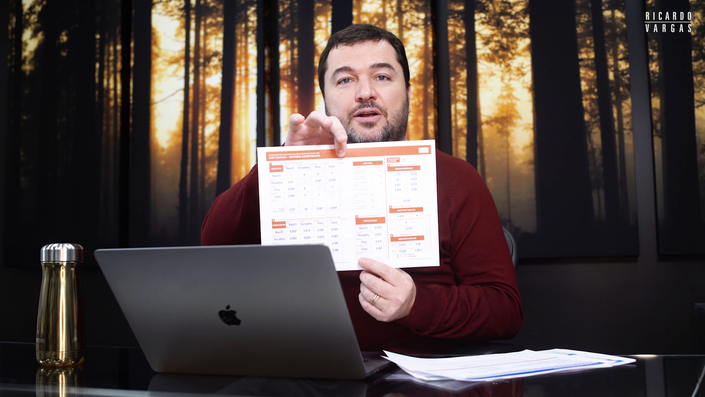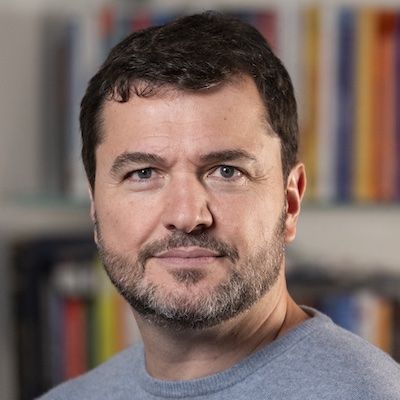
Making Better and More Reliable Decisions Using AHP
Improve your decision-making process in a reliable way using the Analytical Hierarchy Process
Watch Promo Enroll in CourseFollow Ricardo Vargas in a journey to make better decisions. In this self-paced course, Ricardo explains how to use the AHP, or Analytical Hierarchy Process, to make more reliable decisions for your work and your daily life.
Created by Thomas Saaty, AHP is considered today the best approach to remove bias and increase your assertiveness on making decisions.
The course uses real-life examples and guides you on how to make difficult decisions where multiple criteria are in place.
You will learn how to calculate mathematically your decisions, including the consistency on how you decide. The course comes with an AHP canvas and an automated Excel spreadsheet that will guide you in all the mathematical process behind the multicriteria decision.
The course was recorded in English with subtitles in English, Brazilian Portuguese (Português do Brasil), Spanish (Español), Arabic (عربى) and Simplified Chinese (中文).
What is covered?
The full course has 20 lessons covering several guided exercises and examples of content.
At the end of the course you will be able to:
- What is the AHP method
- How to set up a pairwise comparison
- The advantages and disadvantages of using AHP
- How to define the problem to be solved using the method
- Different approaches to compare different criteria
- How to normalize criteria and alternative matrices
- What is the Max Eigen Value, the Consistency Index and the Consistency Ratio
- How to calculate by hand all steps of AHP
- Different applications of AHP in professional and personal decision making
- How to do AHP calculations in Microsoft Excel
- The various software and websites available to support your AHP work
Every lesson aims to be as short as possible. You will learn everything you need to know in the right amount of time at your own pace.
What people have to say the course

Brenda Irwin – Linkedin

Josephine Turner – Linkedin

Hilario Martins – Linkedin

Scholarship and Financial Aid
In mid-2022, Ricardo decided to create the scholarship and financial aid program by donating $10,000 to establish a fund to assist qualified students in pursuing the school's courses.
Eligible candidates can apply for the scholarship all year round. For those aiming to support other students, you can contribute to the fund by making a voluntary donation at the checkout page.
Know more about the program.
This course is part of a bundle

Save 25% when you buy this course together with the Mastering Negotiations Online Course!
In this course, you will learn the most relevant skills and techniques to be able to negotiate in a successful way. It covers the different schools of negotiations (collaboration and competition).
Course Curriculum
-
Preview1.1 - Course Overview (2:16)
-
Start1.2 - Why Making Decisions Is So Hard? (3:14)
-
Start1.3 - What is AHP? (5:01)
-
Start1.4 - Understanding Pairwise Comparison (2:48)
-
Start1.5 - Examples and Uses of AHP: From Project Selection to Life Decisions (4:49)
-
Start1.6 - Advantages and Disadvantages of Using AHP (3:12)
-
Preview1.7 - Ricardo Vargas Bio (Optional) (4:58)
-
Start1.8 - Closing Remarks - Part 1 (1:19)
-
StartGive 20%, get 20%
-
Start2.1 - Overview - Part 2 (2:30)
-
StartDownload (Required) - AHP Canvas - Blank
-
Start2.2 - Defining the Problem to be Solved and the Set of Criteria (4:57)
-
Start2.3 - The Saaty Scale (5:48)
-
StartDownload (Required) - Examples of Saaty Scales
-
Start2.4 - Establishing Priority amongst Criteria Using Pairwise Comparison (11:29)
-
Start2.5 - Checking Consistency (5:22)
-
Start2.6 - Developing and Comparing Alternatives (12:25)
-
StartDownload (Required) - Sheet with the Inconsistent Results Presented in the Lesson 2.6
-
Start2.7 - Evaluating Results (4:17)
-
StartDownload (Required) - AHP Canvas - Fruit Diet
-
Preview2.8 - Closing Remarks - Part 2 (3:07)
-
StartArticle (Optional - English) - Using the Analytic Hierarchy Process (AHP) to Select and Prioritize Projects in a Portfolio
-
StartArtigo (Opcional - Português do Brasil) - Utilizando a Programação Multicritério (AHP) para Selecionar e Priorizar Projetos na Gestão de Portfólio
-
StartArtículo (Opcional - Español) - Utilizando el Proceso Analítico Jerárquico (PAJ) Para Seleccionar y Priorizar Proyectos en una Cartera
Your Instructor

Ricardo Vargas is an experienced leader in global operations, project management, business transformation and crisis management.
Specializing in implementing innovative global initiatives, capital projects and product development, Ricardo has directed dozens of projects across industries and continents, managing more than $20 billion over the past 25 years.
Ricardo shares his expertise and passion with millions of professionals around the globe through his “5 Minutes Podcast,” which he has hosted since 2007 and has reached 12 million views since its release. He has written 16 books on project management, risk and crisis management and transformation, which have been translated into seven languages and sold over half a million copies. His influence on the sector was affirmed when he received the highest recognition of the Project Management Institute, the PMI Fellow Award.
Ricardo is a seasoned board member who has participated in the Brazilian Institute of Corporate Governance (IBGC) board member program. He was the first Latin American Chairman of PMI worldwide, where he served for four years. He also serves on the advisory board of Yera, an Estonian startup dedicated to improving employee performance and engagement through technology and artificial intelligence.
His work as a venture capitalist and entrepreneur in artificial intelligence, blockchain, big data, chatbots and machine learning resulted in tools and products that have revolutionized how users bring agility and agile management into project management software.
More than two decades ago, he founded Macrosolutions, a consulting firm with international operations in energy, infrastructure, IT, oil and finance with dozens of clients globally.
Between 2016 and 2020, Ricardo directed the Brightline Initiative, a Project Management Institute think tank that brings together other leading global organizations into a coalition dedicated to helping executives bridge the expensive, unproductive gap between strategy design and delivery. Ricardo developed and presented a Coursera Online Course on “Bridging the Gap Between Strategy Design and Delivery,” viewed by more than 26,000 students around the globe.
Prior to his work with Brightline, Ricardo directed the United Nations Office for Project Services (UNOPS) Infrastructure and Project Management Group. Based in Copenhagen, Denmark and with operations in more than 120 countries, Ricardo and his team led more than 1,000 projects and $1.2 billion in refugee camps, rural roads, maternity clinics and housing efforts and managed the ESG program, responsible for the first sustainability report in the United Nations system. Following his time at the UN, he collaborated to document the lives of the Zaatari refugee camp in Jordan and create the treatment for the documentary “Zaatari: Memories of the Labyrinth,” a German-Brazilian production that showcases the tragedy of war and the men, women and children seeking a better life.
Ricardo started his career with two partners founding AeC in Brazil, where he was responsible for the services and training areas. A company with three initial employees grew and diversified the business from traditional software sales into outsourcing, project management, call center and IT services, becoming one of the leading technology groups in the country. When Ricardo decided to leave to develop his work internationally, the AeC Group had 1,500 employees. Today, Ricardo continues to appreciate the success of his two former partners, who are now leading the current 25,000 employees.
He holds a Ph.D. in Civil Engineering from Federal Fluminense University in Brazil, an undergraduate degree in Chemical Engineering and a master’s degree in Industrial Engineering from the Federal University of Minas Gerais in Brazil.
Ricardo has received the most relevant international accreditations and credentials in governance, sustainability and also in project, risk and change management. He has also earned accolades ranging from the PMI Fellow and Distinguished Award to the IPMA Achievement Award and the AACE Total Quality Management Award for his leadership in the field.
A dual citizen of Brazil and Portugal, when he’s not traveling the world to share his passion for strategic transformation, Ricardo enjoys gardening and cooking with his wife in their sunny place in Portugal.